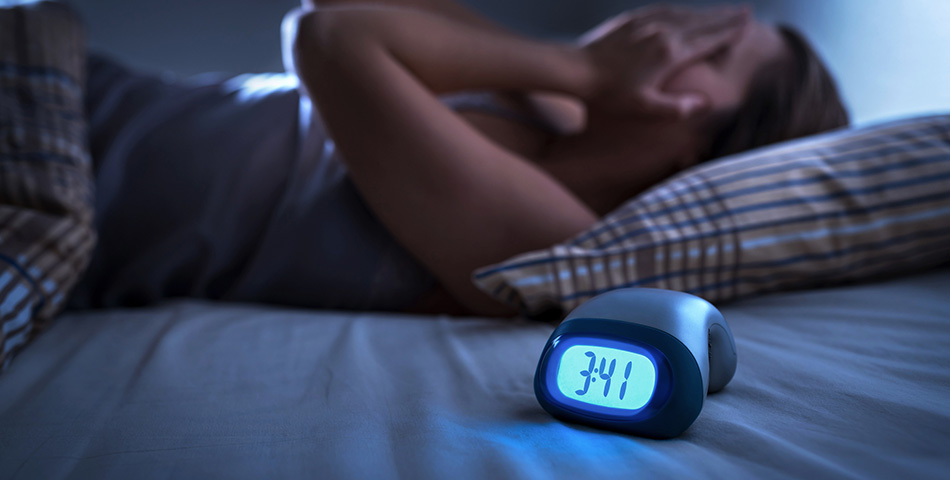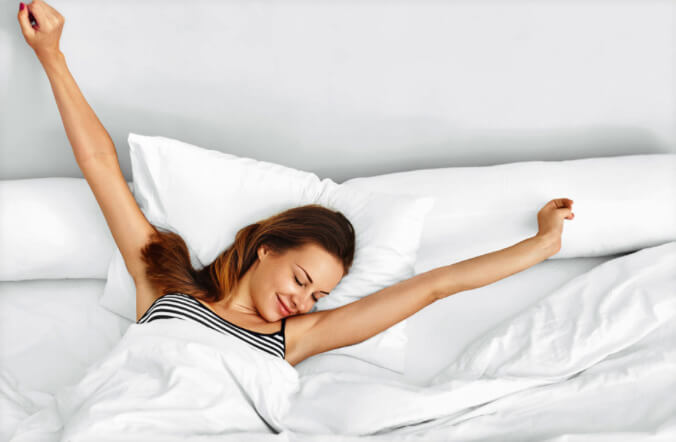Can you guess the first thing that new CBD users often experience?
Hint: it’s often not pain relief, increased mobility, or improved mood—though these things come with time. CBD may not improve your wellness routine or yogic practice on day one, either.
Often, the first and most tangible thing new CBD users experience is this: better sleep.
CBD: Is it Circadian?
But CBD doesn’t affect sleep in the ways we’ve come to expect from more ‘conventional’ sleep aids.
For example, take melatonin during the day at your own risk. It’ll override other circadian cues and signal to your body that it’s nighttime—even if you take it while sungazing during the middle of the day.
Pharmaceutical-grade sleep medication is often no better. Among the slightly depressing options is Klonopin, an anti-anxiety drug that’s effective for sleep but also tends to make its users feel like emotionless zombies.
At Green Maiden, we’re grateful to report a much better way. It’s more holistic, too—it’s CBD! The compound doesn’t override circadian rhythm. Instead it may synchronize your circadian cycles back to the most natural sleep cue there is: the sun. This synchrony is called photo-entrainment.
Here’s a concise look at how it works:
- A healthy endocannabinoid system (ECS) is photoentrained. According to ECS expert Di Marzio, the system helps us “relax, eat, sleep, forget and protect. Endocannabinoid (eCB) levels vary naturally throughout the day, in turn letting the body know when it’s time to rest or sleep.For example, eCB’s are high in the morning, when adaptation to waking life is most needed. And they’re lower in the evening when it’s time to wind down and be still. The endocannabinoid system has even been implicated in dream states.
- This allows for an appropriate level of wakefulness during the day . . . and an appropriate level of sleepiness at night. Endocannabinoid tone (i.e., health) appears to impact the suprachiasmatic nucleus, which is often called the brain’s ‘internal clock’ because it directly oversees natural melatonin secretion.
- Many people have dysregulated endocannabinoid systems, resulting in dysregulated sleep cycles. While the endocannabinoid system can deal with sleep deprivation for a while, even it can get exhausted eventually. Clinical Endocannabinoid deficiency syndrome may be the result. CECDS may cause a whole host of other problems (including migraines or autoimmune issues) that, in turn, could compound existing sleep problems.
- Consistent CBD use may restore endocannabinoid tone. After all, it boosts endocannabinoid (eCB) levels and may even help existing eCB’s do their job better. There’s also some evidence CBD enlarges endocannabinoid receptors, a process called conformational change. In other words, it literally opens the door to improved endocannabinoid system health, resulting in everything from reduced pain to alleviated anxiety to—you guessed it—better sleep.
- With restored endocannabinoid tone comes better and deeper sleep! This includes greater amounts of restorative REM sleep, the possibility of better dreams, and even a feeling of refreshment upon waking.
When taken consistently, CBD may promote photoentrainment by activating and strengthening the endocannabinoid system. This effect could also lead to higher serotonin and GABA levels prior to bedtime. And once sleep-related hormones are optimized, CBD users can expect to feel calmer and more peaceful as they wind down.
Indeed, low GABA levels have already been implicated in sleep problems and insomnia. Correct your hormonal state, and your sleep quality should follow!
No wonder that many CBD users (nearly half of them) find they don’t need their old prescription drugs anymore—sleep aids included. That’s according to a 2017 survey of HelloMD’s online community, which also saw 80% of users describe CBD as very effective or better.
According to Ph.D. Researcher Staci Gruber, it’s well known that medical cannabis patients report coinciding improvements in mood and sleep. She suspects that whole-plant CBD will result in the same good results, and she is currently carrying out some of the most advanced clinical trials on this subject to date.
Perhaps it’s only a matter of time before CBD’s more theoretical impacts on circadian rhythm are fully established by science. In the meantime, feel free to experience the bliss of being in tune with nature for yourself.
CBD for Insomnia

Other CBD-backed benefits have a more indirect effect on sleep. Take insomnia, which is often caused by anxiety and racing thoughts.
Indeed, insomnia is often more mental than physical—if one can even make that distinction. The insomniac’s sleep hormones might be spot on, but they could still be experiencing a different, more conscious type of opposition.
The stress and speed of modern life mean this situation is pretty common. How can one go from 60 back down to zero after taking in unprecedented amounts of sensory information during the day? How can a person go to sleep when their brain just won’t shut off?
Normally, they can’t . . . and traditionally, this was where the Klonopin we mentioned earlier comes in. A Huffington Post writer noted her experience with the pharmaceutical drug: “While it helped me fall asleep, I spent the entire next day feeling like a slightly nauseous zombie. [ . . . ] I decided it wasn’t worth it.”
Soon enough, though, she heard about the potential benefits of CBD. Like so many others, her intrigue (and desperation) persuaded her to give it a shot!
The results? In her own words:
“It was clear I’d stumbled across something kind of remarkable. I often slept well the first few nights of trying something new before it stopped working its magic, which I partially attribute to the placebo effect. With CBD, however, the good nights of sleep kept on coming.”
What makes CBD so good for sleep? The compound’s stress-relieving qualities likely play a role: when one’s mind is calm, their sleep tends to improve almost by default.
Indeed, a 2011 study found that CBD could prevent socially-induced anxiety, and a newer study done in 2020 documented that 66% of the patients in the study noticed better sleep within the first month of CBD dosing. In conclusion, they said, “evidence points toward a calming effect for CBD in the central nervous system.” Even those with PTSD may find that their sleep benefits from CBD usage.
Silencing Pain with CBD
There’s another less obvious benefit of CBD, one that still leads to downstream improvements in sleep. Pain relief! Many people who use CBD find freedom from inflammation and pain, especially in the long run.
According to Dr. Ethan Russo’s review study, CBD is one of the most important hemp compounds for patients with pain—just as valuable as THC or other cannabinoids. Board-certified anesthesiologist Dr. James Taylor agrees: CBD oil has been a “Godsend” for his pain clinic’s patients.
With impacts so holistic, it’s almost tough to determine which part of CBD’s solution is the chicken and which is the egg. Maybe it doesn’t even matter, so long as the compound keeps working.
CBD’s Place in the Active Lifestyle
People with less pain, in turn, may have better mobility and movement. As Dr. Bob Melamede says, cannabinoids are the biochemical “oil of life.” They may help you stay energized and in motion throughout the course of the day, even in the busyness that comes with trying to balance pilates classes, morning runs, and shuttling the kids to school.
And if you’re more active during the day, you might just have a reason to feel tired—i.e., sleep better—at night. Sometimes the best solutions are the simplest ones.
Just think: the good sleep + healthy lifestyle combo that CBD promotes is virtually opposite from the vicious cycle that gets people sleep-deprived in the first place
How to Take CBD for Sleep
When it comes to plant compounds—CBD included—dosing is important. The difference between 5 and 10 milligrams of the compound could be the difference between success and failure.
That’s because CBD’s effects are biphasic. In other words, CBD itself behaves differently depending on how much you take. While 5 milligrams might make you feel energized, 10 mg’s could be slightly sedating.
As you can see, CBD’s effects follow a bell-curve pattern, where moderate dosing is most effective. Image courtesy of Labroots.
Thankfully, CBD’s dose-response curve can be biohacked and leveraged to improve one’s sleep. There’s one thing you should determine first, however: your ideal dose.
For example, let’s say that through some trial and error you realize you feel best on 15 mgs of CBD per day. Awesome! That’s the first step.
Once you know this, you can intentionally overshoot your optimal dose by just a little bit. While that might make CBD’s cumulative benefits slightly less effective, it might also skew them in favor of deep sleep. A known ‘side effect’ of taking large amounts of CBD is drowsiness, after all.
So . . . consider taking 15-20 mg’s in a single large dose, 1-2 hours prior to your bedtime of choice. You might even take your CBD with a fatty meal or healthy dessert to make it more effective.
And there’s always the option to take cannabidiol in conjunction with calming terpenes like linalool. In the future, access to rare cannabinoids like CBN might make experiencing hemp-fueled sleep even easier.
While capitalizing on the biphasic nature of CBD probably presents the surest way to sleep better, don’t be concerned if you haven’t found your ideal dose yet. CBD dosing isn’t rocket science; in fact, it’s not even regular science! It’s practically an art—and a highly individualized one at that. To really dial things in, consider keeping a CBD journal and staying aware of any changes in your day-to-day wellness.
Sleeping better doesn’t have to be complicated. It could be as simple as taking a little CBD every day. As always, consistency is key . . . and that consistency alone could be enough to see you sleeping better than ever before.
To your health,
Green Maiden




